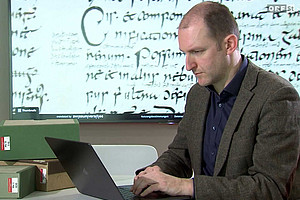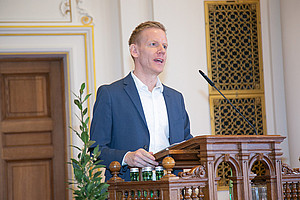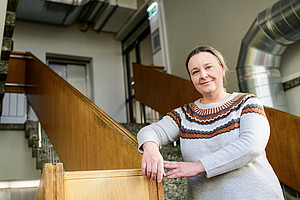The massive refugee flows of 2015 have long since subsided, but many a challenge remains to be mastered. For example, asylum seekers with a residence permit need a permanent and adequate job. Renate Ortlieb has researched what jobs they have found, how comfortable they feel there, and how the companies see the situation. Ortlieb, Head of the Institute of Human Resource Management at the University of Graz, has also developed a concept together with her team for making integration easier.
The study is the first and most comprehensive of its type. ‘All previous studies worldwide have focused on how refugees find a job. But how it goes for them and their surroundings once they get the job is just as relevant for further successful placements’, emphasises Ortlieb. It is important to find longer-term and satisfactory jobs so that those affected do not end up back at the Austrian Employment Service (AMS) after a few months. ‘This also requires a change in companies’ thinking’, says Ortlieb. More flexibility would also make it easier for older people, as well as women, after a long period taking care of children, to find a position.
According to the current survey, about a quarter of those entitled to asylum can make good use of their own qualifications and have better-paid, longer-term employment. ‘However, the wage level for refugees is about 500 Euro lower than the average monthly salary in Austria’, Ortlieb points out. Another 25 per cent feel comfortable at their workplace and are able to develop further, yet they are paid poorly. About a quarter of them feel that they are being exploited, doing unskilled and often dangerous jobs for low wages.
Important bridges
As a general rule, people from Afghanistan and Syria do not have educational certificates recognised here. The AMS certifies their qualifications using skill checks, thereby providing essential support for the job search process. However, private individuals or NGO employees who establish personal contacts with companies and arrange traineeships or trial opportunities are particularly important. ‘Considerably more refugees were employed in this way than through the usual formal application procedures’, says Ortlieb. Patrons and mentors also make an essential contribution to the integration of new employees into firms. ‘Their role should definitely be strengthened, to everyone’s benefit’, emphasises Ortlieb.
Asylum seekers are finding employment primarily in understaffed professions. At their job, many superiors and direct colleagues stand up for them. However, their cultural background is rarely seen as an advantage. ‘Employers could make better use of the skills held by refugees. For example, people from the Middle East often have very good networks within their own communities, and that could also help a company’, says Ortlieb. Moreover, alcohol consumption is a problem in many production facilities, but generally, this doesn’t apply to Muslims.
A little too well-meant
While some companies lack an understanding of different cultural traits, those fugitives who are socially very well integrated are also often under pressure. ‘They are frequently praised effusively, yet at the same time they are expected to assimilate. They are supposed to speak Styrian dialect and be good – or even better – Austrians’, says Ortlieb. It would be important for colleagues and superiors to recognise this otherness and value diversity, as this generally reduces the potential for conflict in the company, including among locals.
Ortlieb has developed a tool that can be implemented quickly and easily in companies in order to eliminate simmering dissatisfaction and promote team development. ‘Working shoulder to shoulder with colleagues, taking a peek at other areas, and conducting staff appraisals in which the topic of migration is openly addressed are effective measures’, says Ortlieb. The concept helps in general to improve structures and cooperation in companies, not just for people from other cultures. ‘This is about recognising, developing and using skills’, summarises Ortlieb.




